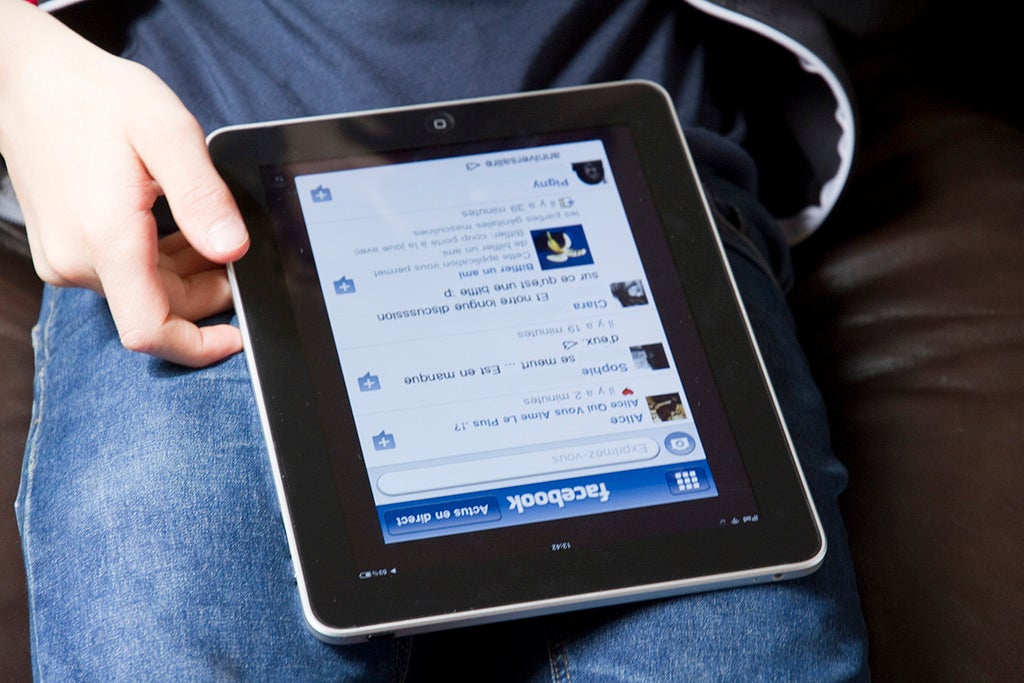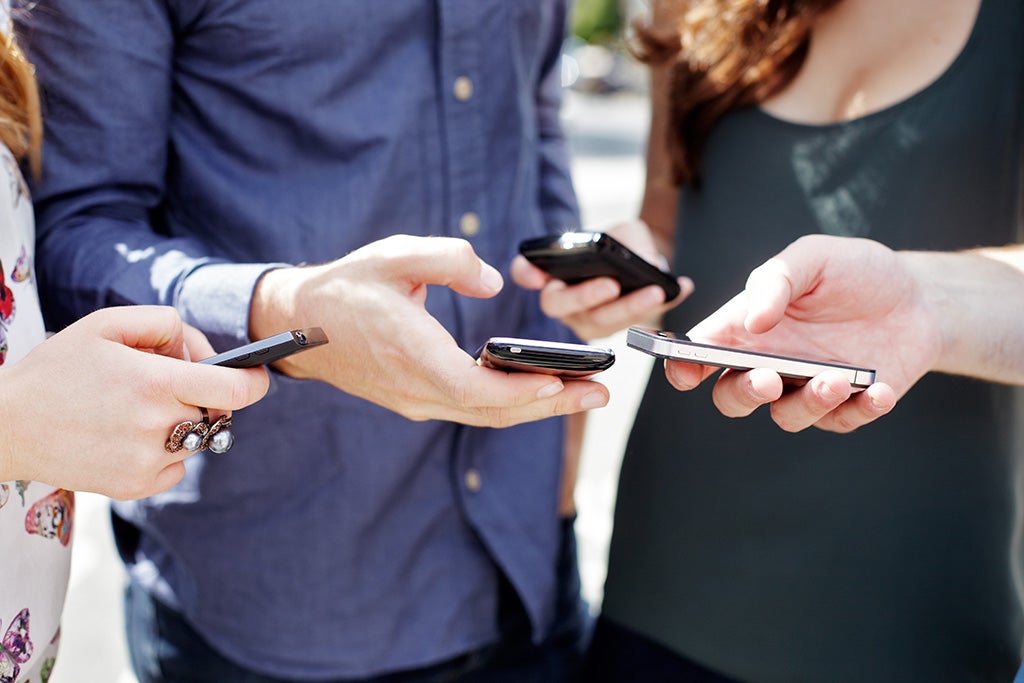The age of social media: could you give it up?
More of us are using it more often than ever - but is it good for us?
.jpg)
Your support helps us to tell the story
From reproductive rights to climate change to Big Tech, The Independent is on the ground when the story is developing. Whether it's investigating the financials of Elon Musk's pro-Trump PAC or producing our latest documentary, 'The A Word', which shines a light on the American women fighting for reproductive rights, we know how important it is to parse out the facts from the messaging.
At such a critical moment in US history, we need reporters on the ground. Your donation allows us to keep sending journalists to speak to both sides of the story.
The Independent is trusted by Americans across the entire political spectrum. And unlike many other quality news outlets, we choose not to lock Americans out of our reporting and analysis with paywalls. We believe quality journalism should be available to everyone, paid for by those who can afford it.
Your support makes all the difference.Chocolate, booze, smoking, laziness… these are all popular things to give up for New Year. But what about a new one – ditching social media?
More people are interacting with each other online than ever before. The number of Facebook users worldwide has doubled between 2010 and 2013, from 608 million to 1,230 million, while Twitter has 284 million monthly users. Britain is at the vanguard, with the second highest social media use in Europe.
A report by Ofcom, the broadcasting regulator, found that two thirds of adults who are online have a social networking profile. According to a survey for online bank First Direct, a third of British users of Facebook are on the network for at least an hour a day, with 12 per cent spending at least two hours on the site. For Twitter users, 31 per cent spend more than an hour on the platform, while 14 per cent – more than 3.6 million people – say their daily usage exceeds two hours.
But what are the psychological impacts of all this? An internet poll by Pencourage, an online diary site, found that two-thirds of web users distort the truth on their online profiles to fit a particular image of themselves, which three out of 10 admitted they could not live up to in real life. This causes a feeling of guilt, and can even lead to memories of events being compromised.
Dr Aric Sigman, a specialist on the impact of screen time on children, said that experts were increasingly aware of the psychological impact of social media across all age groups, but especially in young people. “There is a thing called ‘Facebook Depression’,” he said. “This was reported by the American Academy of Paediatrics, which found that when young people spend too much time on social media sites they begin to show classic symptoms of depression.
“People see that their friends all have six packs, or always look skinny and happy,” he explained. “Or, if I see that you have 500 friends and I just have two – my mother and gran, and my gran has just defriended me – I am going to think you are a winner and I am a loser.”
He made it clear that he is not opposed to social media in principle, but only concerned about its excessive use. He thinks children should not engage in more than two hours of “discretionary screen time” – use for leisure not work – per day. “A fridge is a great piece of technology, but if you use it too much you will get obesity and diabetes – it is the same with social media,” he explained. “There is a ‘dose-response’ relationship, with more hours per day linked to a greater likelihood that negative effects will appear.”
The impact of social media on young people was also examined in a study released by Cancer Research UK, promoting its annual ‘Dryathalon’, which encourages people to abstain from alcohol for a month. It found that one in six 18-34 year olds felt pressured to celebrate New Year’s Eve to look sociable on social media to their peers. This is despite an overwhelming majority of nearly 90 per cent of Brits admitting that they would prefer to stay in on the night or go to a house party.

People are also increasingly concerned at the lasting impact of what they do online, especially on future job prospects. According to Careerbuilder.co.uk, a job-hunting website, 48 per cent of recruiters now screen the social media profiles of applicants. Several high-profile cases, such as the resignation of Paris Brown, the 17-year-old Kent Youth Police and Crime Commissioner, over a series of racist and homophobic tweets, have only exacerbated this concern.
Tim Callow, a 20-year-old student, said: “I've started to become quite careful about what is visible to others on my Facebook profile, especially because employers are using social media for recruitment purposes. Some things that were intended as a joke (and funny for those involved) might not appear that way if seen by recruiters out of context.”
Social media can wreak havoc on the careers of adults too. Brooks Newmark, MP for Braintree, resigned from the government after explicit images appeared on social media. He was snared by an undercover reporter from the Sunday Mirror, who created a fake Twitter profile under the name, ‘Sophie Wittams’, a “twenty-something Tory PR girl”. After a series of conversations, many of a sexual nature, Newmark sent explicit body shots.
People only recently subjected to public scrutiny are especially at risk from embarrassing details spilling out into the public sphere. Solomon Akhtar, the 22-year-old entrepreneur who appeared on the Apprentice TV show, was forced to confess to bosses that he had made a sex tape with a previous girlfriend after friends revealed the information on Twitter under the caption, “revelation of the day”. The tape did not become public, but the risk of this happening undoubtedly caused distress.
Some people, increasingly disillusioned with particular social networks, have decided to quit altogether. The digital consultancy iStrategy Labs wrote a study earlier this year which found that Facebook had 4,292,080 fewer American schoolchildren and 6,948,848 fewer university-aged users than in 2011.
Michael Miller, a student at Durham University, avoids Facebook because of its implications for personal privacy. “Social media’s insidious influence on the lives of teenagers is largely unquestioned and unchallenged,” he said. “Most people of my generation do not realise how serious the trivial things are, especially when it comes to social media and individual privacy. They do not appreciate that Facebook is not really a service but more a surveillance platform. In the light of the Snowden revelations, that is not empty paranoia.”

But even if you join the abstainers, social media is clearly not going away. Online networking has revolutionised the way in which information is disseminated. According to a report by the Pew Research Centre, a US think-tank, social media users are not only consuming news, but contributing to reporting as “citizen journalists”. Nearly half of users have discussed a news story on social media, while 14 per cent have contributed photos they have taken of a news-worthy event.
Dr Tom Felle, Acting Director of Interactive and Newspaper Journalism at City University, said he doubts that citizen journalism is capable of replicating the quality of news produced by professional journalists. “Social media is not journalism, but information,” he said. “For example, there is still a real need for local newspapers, but these are being killed by social media.”
Gemma Went, a social media consultant, said that the platforms of the future need to meet the immediate needs of their users. The inglorious falls of Bebo and MySpace show just how quickly consumers become bored of existing platforms. Bebo was at its zenith in 2008, when it was sold to AOL for $850m, before declining rapidly as Facebook became increasingly dominant. Similarly, in December 2008 MySpace pulled in 75.9m monthly unique visitors in the US, according to figures from data service ComScore, but by May 2011 this had plummeted to 34.8m.
“Facebook hasn't been cool for some time,” she said. “But its ubiquitous nature makes it hard for people to stop using it (even with the issues of data, privacy and advertising). Friends and family are there so it feels like you have to be there, or miss out.
“Instagram met a real desire to share our lives through photos and aligned perfectly with the selfie phenomenon, Snapchat dealt with the issue of privacy (albeit with a few problems of its own). People will flock to try the new ‘cool’ thing, but if it doesn't meet a need or desire, they won't stay. If it does, most consumers will keep using whether it's cool or not.”
Jen Smith, who works with businesses to maximise their exposure on social media, thinks that companies will increasingly focus on social networking platforms that are combined with a search engine function, such as Google +. “I think businesses will no longer consider Facebook as their number one go-to network,” she said.

One undoubted growth area is in smartphones. The latest report on social media trends by the polling organisation IPSOS Mori found that 9 in 10 Twitter users access the platform through their phones. This is fuelled by the consumer’s desire for immediacy and spontaneous sharing, represented by the photography app Snapchat. The report claims it is the “ephemeral nature” of Snapchat that makes it attractive to users, who enjoy being able to share photos without the concern that they will stay online forever.
There is a series of new platforms aiming to take the smartphone market by storm, one of which is Secret, a programme that allows users to share their feelings and thoughts anonymously, with all messages coming from Facebook friends or people in your contacts. The idea of anonymity is similar to another network, Ask.fm, which became notorious after several teenagers committed suicide after receiving abuse from other users. Whether the new app will face similar troubles remains to be seen.
Another venture is Spayce, a programme that connects like-minded people who are within 100 metres of each other physically using mobile technology. Users can choose between a personal and professional profile depending on who they want to connect with. As the app is at an early stage of development, it currently has very limited access. It will face fierce competition from other start-ups, but the rewards for success are considerable.
So it is obvious that people are a long way away from getting bored with social media. Although there are drawbacks, the ability of these networks to deliver quick news and interaction with friends and family mean they still exert an almost irresistible urge. But if you think you have got what it takes to quit, it could make your life next year very different indeed.
Join our commenting forum
Join thought-provoking conversations, follow other Independent readers and see their replies
Comments